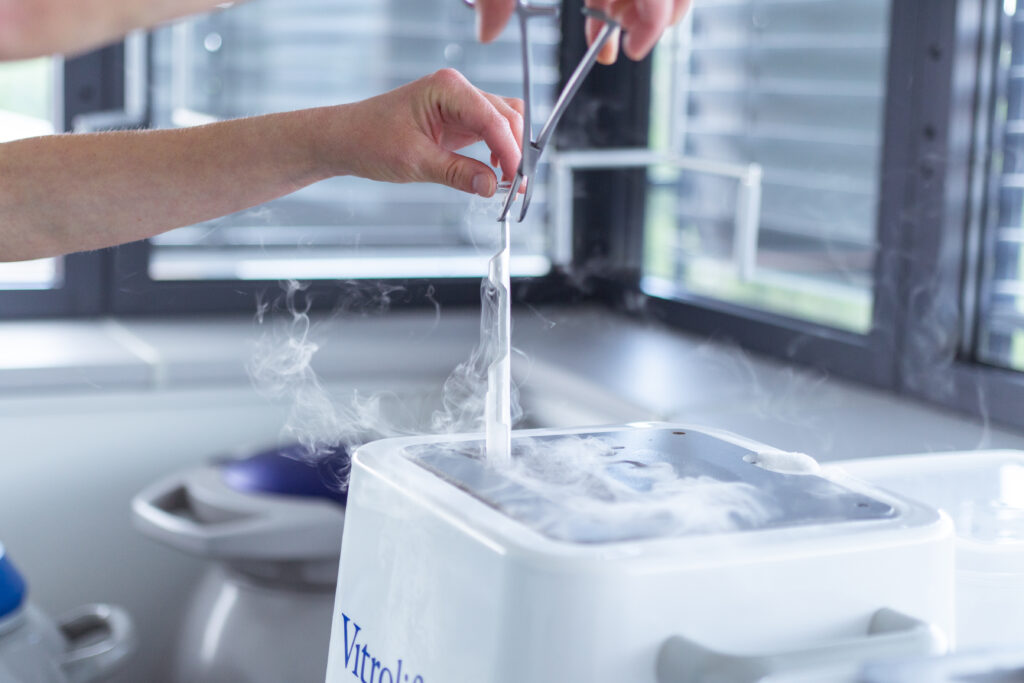Implantation, the process in which the embryo embeds itself in the uterine lining to develop over the next nine months, is one of the pivotal moments in IVF. Many couples encounter difficulties with implantation. However, several effective aids can assist in the successful implantation of an embryo.
When Does Embryo Implantation Occur and How Long Does It Last?
Implantation is considered the real beginning of pregnancy. In natural conception, it starts between the 6th and 7th day after fertilization of the egg by the sperm and concludes by the 12th day post-fertilization.
What Symptoms Can You Experience Post-Implantation?
Typically, implantation, or the embedding of the embryo, is not accompanied by physical pain. However, some women may feel pressure in the lower abdomen or breasts, nausea, headaches, or mood swings. Light bleeding can occur due to minor injuries to blood vessels in the uterine lining during embryo nidation, sometimes mistaken for a mild period. However, regular menstruation should not occur after successful implantation, as it signifies the start of pregnancy. But what if there are problems with implantation?
Why Test Endometrial Maturity and How Is It Conducted?
Problems with embryo implantation (nidation) can be caused by the uterine lining, or endometrium, which might not be adequately prepared for the transfer. Testing endometrial maturity ensures that the embryo transfer occurs at the optimum time, known as the implantation window. This is a brief period, typically around the 19th to 21st day of a regular menstrual cycle. In cycles with hormonal treatment, the endometrium is usually ready for implantation five days after the first administration of progesterone. However, the growth of the lining is always individual, both in natural and hormonally controlled cycles, with up to 35% of women experiencing a shifted implantation window.
Determining the Implantation Window with beREADY and EndomeTRIO Tests
The appropriate time for transfer is determined based on the analysis of a uterine swab using the beREADY test. Based on the results, the ideal transfer time is established. This test is particularly recommended for couples who have obtained a small number of embryos or have experienced repeated failures in embryo attachment.
The EndomeTRIO test is a comprehensive examination that conducts three tests simultaneously from a single sample of the uterine lining. In addition to determining the implantation window, it also analyzes the bacterial balance of the endometrium and detects bacteria causing chronic inflammation. In contrast, the beREADY test only determines the implantation window but is more cost-effective.
How to Increase the Success of Embryo Implantation – Transfer?
EmbryoGlue helps with attaching the embryo in the uterus. The special culture medium EmbryoGlue™ increases the chances of successful implantation. The term ‘glue’ refers to the medium acting as a tissue ‘adhesive’. EmbryoGlue creates an environment with higher viscosity to closely mimic the conditions in the uterus. Additionally, it contains a high concentration of proteins, providing the developing embryo with essential vitamins, nutrients, and hormones, giving it energy for further growth.
How Does the Entire IVF Treatment Process Work at Repromeda?
IVF treatment is intended for couples who have been unable to conceive for more than six months (if the woman is over 35 years old) or a year (if the woman is under 35 years old). It consists of several steps:
- Initial consultation
- Examination of both partners
- Selection of the appropriate infertility treatment method
- Hormonal stimulation
- Retrieval of eggs and sperm
- Fertilization of eggs and cultivation of embryos
- Cryopreservation
- Embryo transfer
- Positive pregnancy test



